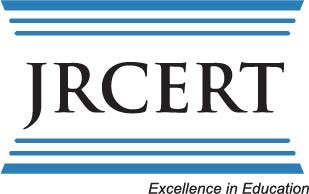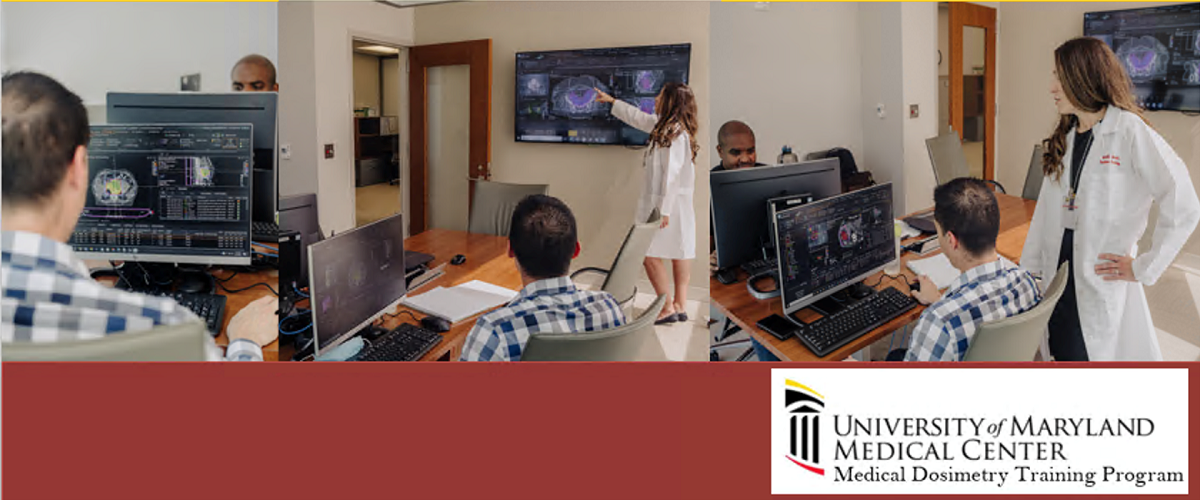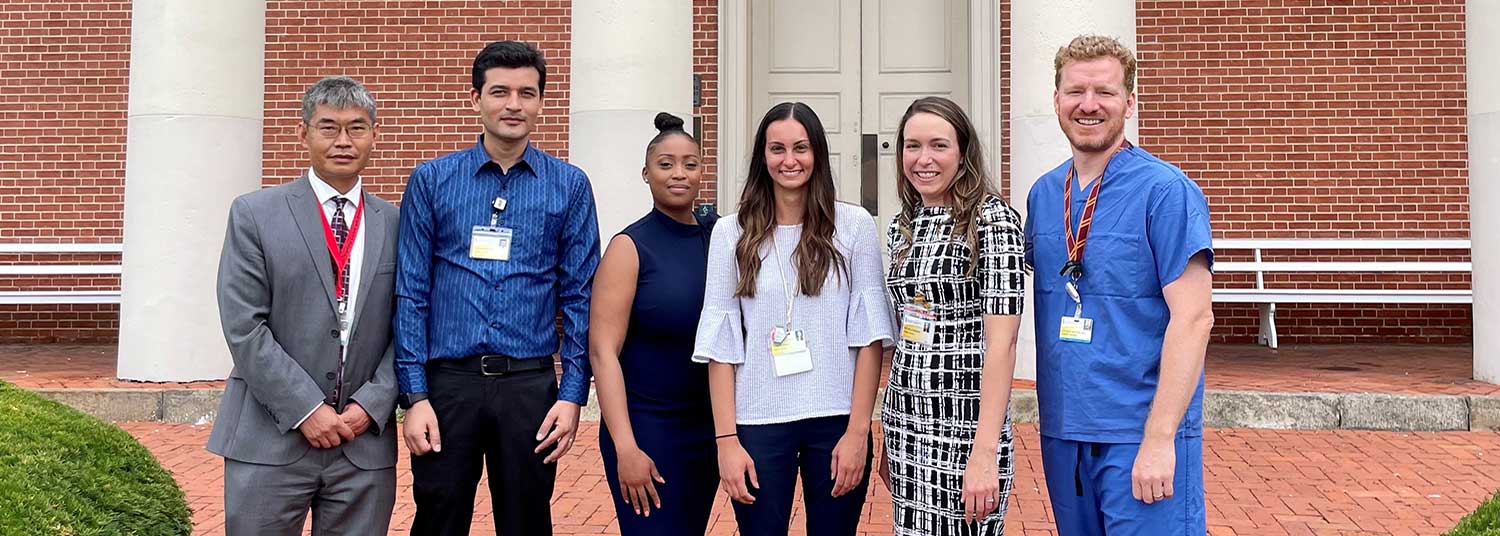What is a Medical Dosimetrist?
Medical dosimetry is the subspecialty of radiation oncology that focuses on treatment planning, dose measurement, dose calculations and quality assurance for radiotherapy treatments designed to treat cancer. The medical dosimetrist is an integral member of the "treatment team" that includes a radiation oncologist, a medical physicist and radiotherapy technologists.
Under the direction of the medical physicist and the radiation oncologist, the dosimetrist determines the beam arrangements, beam shapes, beam weights and beam energies that provide the highest-quality treatment plan. The dosimetrist also contributes to quality assurance and to the construction of special treatment devices. In addition, the medical dosimetrist plays an important role in brachytherapy procedures, providing technical assistance and completing any necessary calculations.
About the University of Maryland Medical Dosimetry Certificate Program
History of the Program & Accreditation
 The University of Maryland Medical Center Dosimetry Program is accredited by the Joint Review Committee on Education in Radiologic Technology
The University of Maryland Medical Center Dosimetry Program is accredited by the Joint Review Committee on Education in Radiologic Technology
20 North Wacker Drive
Suite 2850
Chicago, IL 60606-3182
312-704-5300
Email: mail@jrcert.org
The program’s current award is eight years. General program accreditation information and the current accreditation award letter can be found here.
Accreditation of our program has been effective since May 10, 2007. In 2018, our program was re-accredited by the JRCERT for a total of eight years, until the second quarter of 2026. The program successfully completed its interim review in 2022.
The Department of Radiation Oncology, under the auspices of the University of Maryland Medical Center, opened the School of Medical Dosimetry in 2001. As of 2023, the University of Maryland program has celebrated 49 dosimetry graduates, and is one of only 15 accredited programs in the United States. Students of this program are University of Maryland Medical Center dosimetry trainees, not students of the University of Maryland. Our one-year program combines an extensive curriculum with hands-on training to prepare our students for a career in medical dosimetry.
Mission Statement
Mission Statement
“To provide world-class education and training in medical dosimetry and produce competent dosimetrists who serve the needs of the community through the treatment of patients with radiation”
Objectives
Objectives
- Provide education and expertise in medical dosimetry through didactic and clinical instruction
- Foster critical thinking, analytical skills, and problem solving in the rapidly changing world of science and technology
- Promote a commitment to patient care and professional development
Goals and Outcomes
Goals and Outcomes
Goal 1: Students will graduate as clinically competent dosimetrists.
Student Learning Outcome:
- Students will be able to design usable plans for external beam radiotherapy including 3D conformal radiotherapy and intensity modulated radiotherapy
- Students will be able to demonstrate an understanding of image-guided radiation therapy as it applies to planning and treatment
Goal 2: Students will demonstrate the critical thinking skills required for medical dosimetry.
Student Learning Outcome:
- Students will demonstrate an understanding of the physics and radiobiology of radiation therapy
- Students will be able to sufficiently respond to questions from staff dosimetrists, physicists, and physicians regarding their treatment plans
Goal 3: Students will effectively communicate within an interdisciplinary radiation oncology team.
Student Learning Outcome:
- Students will effectively communicate with doctors, physicists, and dosimetrists
- Students will display effective oral communication skills
- Students will display effective written communication skills
Goal 4: Students will conduct themselves in a professional manner and practice the ideals of professional growth and lifelong learning.
Student Learning Outcome:
- Graduates will demonstrate lifelong learning
- Students will conduct themselves in a professional manner
Goal 5: Students will graduate as entry-level dosimetrists.
Student Learning Outcome:
- Students will obtain a job in the field of medical dosimetry
- Students will take the Certified Medical Dosimetrist (CMD) board examination within one year of graduation
- Students will feel prepared to enter the workforce as entry-level dosimetrists
- Students will complete the program within 12 months
- Students will pass their CMD board exams within two years of graduation
- Employers will be satisfied with the performance of graduates
Curriculum
Curriculum
Information on our curriculum is provided in our Dosimetry Program Handbook. Our program provides each graduate who completes all courses a certificate of completion. We are not a degree-granting program. Therefore, the Dosimetry Program is not presently recognized as a degree-granting higher education organization, or branch of such, by student loan managing agencies.
Course credits from our Medical Dosimetry Program cannot be counted towards a higher education degree from a higher education organization, nor can credits from other programs be counted by our program. However, to demonstrate our commitment to educational excellence, the University of Maryland Medical Center's School of Medical Dosimetry was previously recognized by the Medical Dosimetry Certification Board (MDCB), and is presently accredited by the Joint Review Committee on Education in Radiologic Technology (JRCERT).
JRCERT accreditation is part of the eligibility requirements by the MDCB and our program fulfills this requirement. However, the applicant, student or graduate is urged to contact the MDCB with questions of eligibility at any time.
Applying to the Program
Applying to the Program
The application deadline is December 1, for a start date of July 1 the following year. Individuals interested in applying to our program may download our required Application Form and Reference Form, and submit in-full with a statement of interest and transcripts before the deadline to be considered for admission. Prospective applicants may also find extensive information about our program in the Student Handbook. The Department of Radiation Oncology, under the auspices of the University of Maryland Medical Center, offers a one-year JRCERT-accredited certificate program in Medical Dosimetry.
Program Effectiveness Data
Access the most recent dosimetry Program Effectiveness Data
The medical dosimetry program is accredited by the
Joint Review Committee on Education in Radiologic Technology
20 North Wacker Drive, Suite 2850
Chicago, IL 60606-3182
312-704-5300
Email: mail@jrcert.org
The programs current award letter is eight (8) years. General program accreditation information and the accreditation award letter can be found here.
For more information regarding program effectiveness data visit the JRCERT website.
Information for Prospective Applicants and Current Students
Information for Prospective Applicants and Current Students
Admission Policies
Our admission policy is designed to find the best match of student interest, achievement, and ability with our own program's objectives, goals, and plan of assessment and development. We do not favor one group of applicants, race, color, ethnic origin, national origin, age, gender or sex. Similarly, we do not discriminate based on race, color, ethnic origin, national origin, age, gender or sex, or economic status. We only favor the applicants that are best suited to enter the program based on their academic excellence, interest in our program, and professional commitment and achievement. Such metrics are evaluated from the applications submitted, the recommendation letters, and the applicants' performance during an onsite interview.
Equal Opportunity
The University of Maryland Medical Center (UMMC) is actively committed to providing equal educational and employment opportunity in all of its programs. It is the goal of the university to assure that women and minorities are equitably represented among the faculty, staff, and administration of the university, so that its work force reflects the diversity of Maryland's population.
All employment policies and activities of UMMC shall be consistent with federal and state laws, regulations and executive orders on nondiscrimination on the basis of race, color, religion, age, ancestry or national origin, sex, sexual orientation, handicap, marital status, and veteran status. Sexual harassment, as a form of sex discrimination, is prohibited among the work force of the university.
Credit Transfer
The UMMC Medical Dosimetry Program is not a degree-granting higher education organization. Hence, we do accept transfer of credits or provide credits that can be transferred to higher education organizations for degrees granted by those institutions.
Appeal Process
Students are expected to be in good standing in the program to continue employment and complete the one-year program. Good standing includes non-complaint of behavioral or professional misconduct. Complaints are resolved through an appeal process. The appeal process is only available to full-time employees of UMMC after an initial six-week probationary period, which starts on the first day of employment. The guidelines and regulations of the appeal process are set by the policies governing employees of UMMC. The appeal process is part of a due-process procedure. Due-process procedures provide students with an unbiased avenue to pursue complaints or grievances and the opportunity to be heard in a timely manner. The appeal process is available to students after their initial probationary period as hospital employees.
Information for non-U.S. nationals and non-permanent-US residents
Student visas, working visas or work permits are not sponsored by our program on behalf of applicants who are not permanent residents or citizens of the U.S.
Additional Resources for Current Students of the School of Medical Dosimetry
You may learn about policies for timely resolution of complaints by accessing the employee handbook within our hospital system intranet (accessible only to employees and students of our program). This webpage is essentially your portal to hospital employee services.
Allegations of non-compliance with educational standards can be forwarded to the director of the program, or to hospital administration. Questions about our curriculum; admission policies, transfer of credits, tuition and fees, refund policies, academic calendars, academic policies, graduation requirements, student services not answered in this webpage, or in our handbook can be obtained by contacting the program director.
Frequently Asked Questions
What does the program offer?
The program prepares qualified applicants for a career in medical dosimetry. Graduates of our medical dosimetry program are eligible for national certification by the Medical Dosimetry Certification Board.
Up to four students are accepted into the program each year, depending on program funding. This ensures that each student receives ample personal attention and can work closely with our dosimetrists and physicists.
How long is the program?
Our medical dosimetry program is 12 months long. It starts July 1, and ends June 30 of the following year.
What are the objectives of the program?
- Provide an education that facilitates the mastery of entry-level dosimetry skills through didactic and clinical experiences.
- Provide an orientation to the range of health care settings in which dosimetrists practice.
- Foster continued development of critical thinking, analysis and problem solving.
- Promote a commitment to community and professional service.
How is the department situated and how is it staffed?
The University of Maryland Department of Radiation Oncology has seven locations:
- University of Maryland Medical Center in Baltimore, MD
- Central Maryland Radiation Oncology in Columbia, MD
- Tate Cancer Center at UM Baltimore Washington Medical Center in Glen Burnie, MD
- UM Upper Chesapeake Health Kaufman Cancer Center in Bel Air, MD
- Maryland Proton Treatment Center in Baltimore, MD
- Requard Radiation Oncology Center at UM Shore Regional Health in Easton, MD
- Radiation Oncology at the UM Capital Region Health Cancer Center in Largo, MD
Each site is staffed with University of Maryland faculty. This affiliation opens the door to leading-edge treatment modalities, cutting-edge clinical trials and expert consultation with University of Maryland Greenebaum Comprehensive Cancer Center physicians.
In 2015, the University of Maryland School of Medicine announced the opening of the Maryland Proton Treatment Center (MPTC). This center was the first in the region to offer proton therapy – a highly advanced and precise form of radiation – to treat cancer. MPTC offers the most advanced form of proton therapy in the world, called pencil beam scanning. This technique is highly effective for a wide variety of solid, localized tumors in adults and children. Visit the MPTC website to learn more.
As a part of their clinical practicum, students rotate through the University of Maryland Medical Center (sponsoring location/primary site), the Maryland Proton Treatment Center, Central Maryland Radiation Oncology, and the Tate Cancer Center at UM Baltimore Washington Medical Center.
What are the admission requirements?
Trainees must hold a Bachelor of Science or a Bachelor of Applied Science degree, with a minimum overall GPA of 3.0. This includes graduates from an accredited radiation therapy program. All applicants must have completed post-secondary instruction in the following areas:
- Anatomy and physiology
- Biology
- Mathematics (including geometry, college algebra and trigonometry)
- Physics
- Written and verbal communication
- Computer competency (Microsoft Office, video conferencing etc.)
What does the curriculum include?
The curriculum includes didactic lectures, laboratory exercises, and clinical instruction. Information on our curriculum is provided in our Student Handbook.
When is the deadline for accepting applications?
Applications are accepted through December 1 for each upcoming year, and classes begin on July 1 of the following year. Interviews with selected candidates are scheduled between February 1 and March 15 of each year.
Are students of your program considered students of the University of Maryland?
No. Under the contract provided to each student, a student joins our organization as a hospital employee (dosimetry trainee) of the University of Maryland Medical Center. Students are not students of the University of Maryland. Instead, students receive a certificate of completion from the Medical Dosimetry Program. We do not grant a higher education degree. As a result, students cannot carry credits over to other programs that yield degrees from higher education organizations. For example, the time spent at the Dosimetry Program in our department cannot be carried over to credit a bachelor's, master's, associate, or doctoral degree from University of Maryland.
Where can I obtain more information about medical dosimetry?
Contact
For additional questions regarding the program, please contact:

Junliang Xu, PhD
Assistant Professor of Radiation Oncology
University of Maryland School of Medicine
Director, Dosimetry Training Program
Department of Radiation Oncology
22 S. Greene St.
Baltimore, MD 21201
Phone: (410) 328-2174
Junliang.Xu@umm.edu

Keona Davis
Administrative Coordinator
University of Maryland
Department of Radiation Oncology
22 S. Greene St., Suite GGJ02
Baltimore, MD 21201
Phone: (410) 328-2323
Fax: (410) 328-2618
keonadavis@umm.edu


